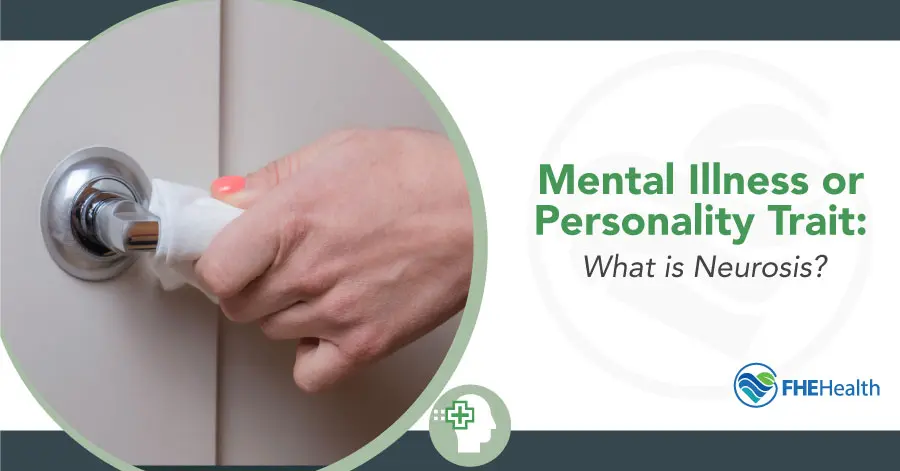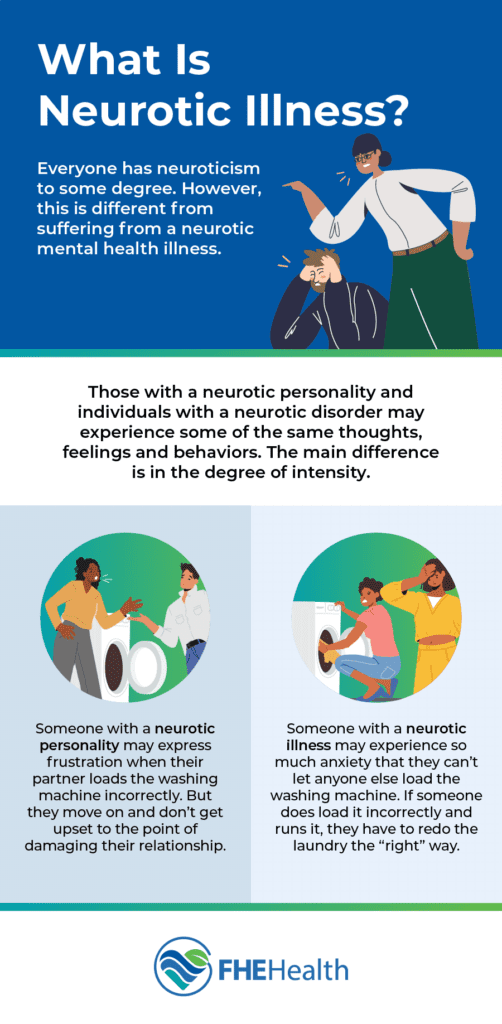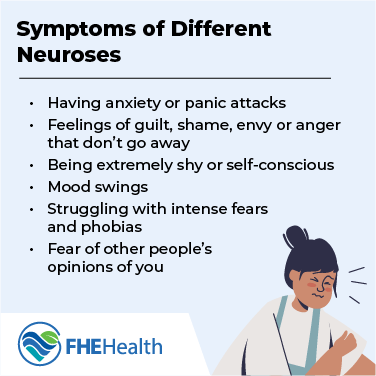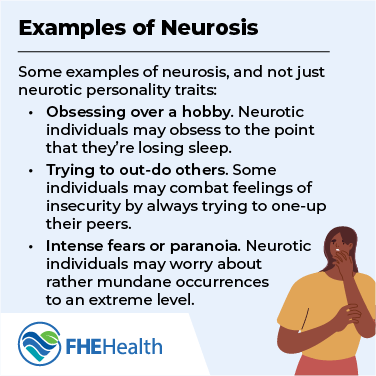
It seems like every popular TV show has a token neurotic friend character. They’re usually portrayed as a little quirky but still endearing. The show’s plot points may center around humor or jokes about the character’s neuroses or casually toss around mental illness terms such as OCD (Obsessive-compulsive disorder).
However, the reality of living with a neurotic illness is very different. Keep reading to learn the difference between a neurosis trait and neurotic illness symptoms and what to do if you think you’re suffering from the latter.
How to Define Neurosis
Experts define neurosis as any mental disorder that causes a person distress and some sort of deficit in day-to-day function. This distress is out of proportion with whatever action causes it. The severity of the reaction and the impact it has on daily life influences whether we describe it as a quirky personality trait or an actual mental condition requiring treatment or intervention.
What Is Neurotic Illness?
 Neuroticism is one of the main categories of personality, and everyone has it to some degree. However, this is different from suffering from a neurotic mental health illness. Those with a neurotic personality and individuals with a neurotic disorder may experience some of the same thoughts, feelings and behaviors. The main difference is in the degree of intensity.
Neuroticism is one of the main categories of personality, and everyone has it to some degree. However, this is different from suffering from a neurotic mental health illness. Those with a neurotic personality and individuals with a neurotic disorder may experience some of the same thoughts, feelings and behaviors. The main difference is in the degree of intensity.
Those with a neurotic illness have more extreme reactions, such as anxiety, anger or panic attacks, when things aren’t going the way they prefer. These emotions and reactions can interfere with relationships and work responsibilities and have a negative impact on the person’s quality of life.
Common Misconceptions about Neurotic Illness
As an example of neuroticism, we all know someone — or are someone — who believes the dishwasher should be loaded a certain way. They may express frustration when someone doesn’t load it properly, but after that, they move on until it happens again. They don’t spend hours or days thinking about it, and they don’t get angry or upset to the point of damaging their relationships.
However, someone with a neurotic illness may experience so much anxiety that they can’t let anyone else load the dishwasher. If someone does load it incorrectly and runs it, they have to take the clean dishes out, reload them the “right” way and then rerun the dishwasher.
This and other neurotic behavior examples demonstrate how intensity can be a deciding factor between a preference or quirk and an actual mental health issue. It’s very common in today’s world to hear statements like “I’m a little OCD.” However, these are gross generalizations of these types of disorders and how badly they can impact those suffering from true mental health issues.
When to Seek Professional Help for Neurosis
People often present for treatment once the symptoms or impairment have become too great to function in some aspect of their lives. Dr. Beau A. Nelson, DBH, LCSW, Chief Clinical Officer at FHE Health, explains that “there is a difference when someone has a particular personality trait that is minor versus when their life becomes consumed with dealing with thinking and emotional issues.”
The bottom line: If you feel your thoughts and behaviors are keeping you from living the life you want — or if your loved ones have expressed concern — it’s a good idea to talk to a mental health care provider. A professional can help you identify what you’re going through and offer possible paths forward.
Symptoms and Examples of Different Neuroses
 There’s significant overlap between symptoms of a neurotic personality and someone actually experiencing neurosis. Again, much of the definition comes to extremity. Some possible symptoms include:
There’s significant overlap between symptoms of a neurotic personality and someone actually experiencing neurosis. Again, much of the definition comes to extremity. Some possible symptoms include:
- Having anxiety or panic attacks
- Feelings of guilt, shame, envy or anger that don’t go away
- Being extremely shy or self-conscious
- Mood swings
- Struggling with intense fears and phobias
- Fear of other people’s opinions of you
Some examples of neurosis, and not just neurotic personality traits, would be:
- Obsessing over a hobby. While many people relax with some yarn and a crochet needle, neurotic individuals may obsess to the point that they’re losing sleep or neglecting relationships.
- Trying to outdo others. While obsessed with their own insecurity, some individuals may combat these feelings by always trying to one-up their peers.
- Intense fears or paranoia. Worrying about rather mundane occurrences to an extreme level is another example of neuroticism. For instance, if you have a flight and must arrive at the airport an hour in advance, you arrive 5 hours in advance and then ask the gate agent repeatedly if the flight is still on time.
What Are the Effects of Ignoring Symptoms of Neurosis?

While mental health awareness has increased in recent years, it’s still common for people to brush off their symptoms as personality quirks or something they don’t have the time to attend to right now. However, this can be a dangerous game.
When symptoms of neurosis are ignored, they may become more severe over time. This can lead to an individual not being able to maintain personal relationships, hold a steady job or leave their own house for extended periods. All of this can result in isolation, financial difficulties and other issues such as agoraphobia.
This can begin to impact a person’s physical health just as much as their emotional health. Not being able to leave the house without anxiety can increase the risk of depression. If the person isn’t able to keep a job, they could end up in poor living conditions or not having easy access to nutritious foods.
Could the Symptoms of Neurosis Be Caused by Something Else?
It’s possible for symptoms of neurosis to be brought on by other things, such as changes in brain chemistry or side effects of some medications. It’s also common for neurotic illness to be present with other mental health issues, such as eating disorders, schizophrenia and attention deficit disorder.
Should You Get Diagnosed?
If you have symptoms of neurosis that are affecting your quality of life, talking to a healthcare provider is an important first step. Doctors, psychologists, psychiatrists and some counselors may provide a mental health diagnosis.
Before you’re diagnosed, the provider may ask about your neurosis symptoms, including their severity, and other questions about your life and relationships. You may also be asked to complete a questionnaire or personality assessment. Your provider will review all this information and see if it qualifies for a diagnosis of neurotic illness — or possibly another related illness.
It’s common to be worried about getting an official mental health diagnosis and what that might mean for the rest of your life. There’s still a stigma in some circles when it comes to mental health, and some people may be worried about what their friends or family might think. However, the most important thing to consider is your own quality of life. A mental health diagnosis doesn’t define you; it’s a guide for treatment.
Getting an official diagnosis is often a huge relief for those who’ve been experiencing different neuroses without really understanding them. And it can be incredibly helpful to know there are people who understand what you’re going through and can support you through treatment and management.
A Better Life Is Possible
If you or a loved one has been dealing with a neurotic illness, it can be difficult to imagine a better life, but it is possible. Talking to a mental health professional who understands your symptoms and can help you figure out how to best deal with them is the first step. Whether your treatment plan includes therapy or medication, it’s likely you can improve your overall quality of life.
At FHE Health, we know it can be a challenge just to get through the day when you’re struggling with mental health issues like neurosis. But we also know there’s hope for a better life through proper diagnosis and treatment. Reach out to our compassionate counselors to learn more today.






